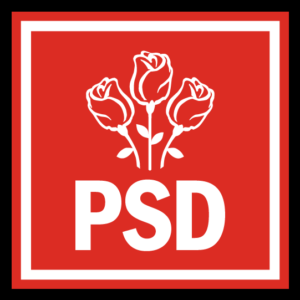PRM has advocated for an ethnic form of nationalism, with the ultimate goal of recreating Greater Romania, with the borders of the interwar period. The party aims to unite all ethnic Romanians into a homogeneous state, advocating for the annexation of Moldova. They have also campaigned for a ban on the Hungarian-dominated party UDMR, accusing them of wanting to break away Transylvania from Romania.
The Socialist Party of Labour (PSM) was a relatively short-lived leftist extremist party, de facto communist, formed in 1990. It entered parliament in 1992 with a narrow margin and gained some influence by being part of the coalition government. PSM lost its parliamentary seats in 1996 and was finally dissolved in 2003.
In 1996, the right-wing opposition managed to win the election. Since then, Romanian politics has been dominated by relatively centrist parties (liberals, conservatives, social democrats). No extremist party has been part of the government since 1996. However, several anti-establishment parties have emerged, achieving temporary success but rarely becoming long-lasting.
The New Generation Party was a right-wing extremist nationalist party formed in 2000, which at best won two percent in the 2004 election. From 2003, it was led by Gigi Becali, owner of the Steaua Bucharest football club. Becali later joined the PRM.
The People’s Party – Dan Diaconescu was formed in 2011, entered parliament in 2012, and dissolved due to internal divisions two years later. The party gained votes on promises to fight corruption and increase social justice, largely due to the leader’s significant media visibility.
The most recent example is the Alliance for Romanian Unity (AUR). The party was formed in the fall of 2019 and surprised most by becoming the third-largest party in the 2020 election. Party leader George Simion had previously been involved in the issue of uniting Moldova and Romania, and the party name alludes to the dream of reuniting all Romanians in a Greater Romania, i.e., claiming Moldova.
The vice-party leader has a background in a citizen movement advocating for a traditional view of marriage, campaigning for a constitutional amendment to guarantee that only a man and a woman can enter into marriage. However, the party is not opposed to abortion. In August 2022, George Simion live-streamed his wedding on Facebook and invited the entire population to watch, provided they were wearing traditional Romanian attire.
The party is pro-NATO, advocates for energy self-sufficiency, sees Fidesz and PiS as role models, and associates itself with the ECR in the European Parliament.







